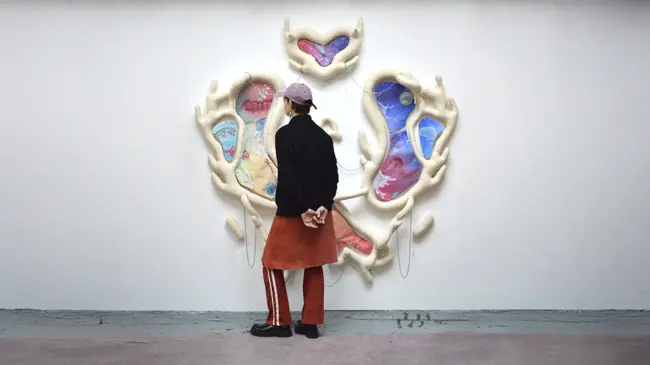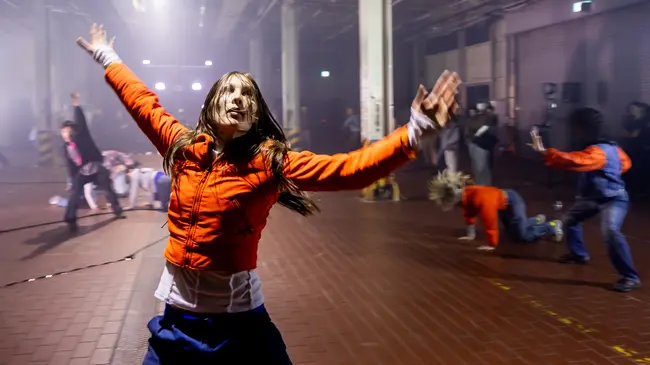Textiles are my way to understand the post-colonial heritage

Benjamin Mengistu graduated in Textile Design at KASK & Conservatorium in 2020. Since then, the artist and designer has been involved with various projects going from luxury fashion houses to stage set design for performances and artwork productions for exhibitions. With KASK's Open Day happening soon on April 23, we sat down with Benjamin to talk about the development of his practice and the role of his studies in a more political approach to his creations.
Before taking part in the Textile Design Master at KASK, did you feel the need to test different fields to find out what you really wanted to do?
Since I was young, I’ve always wanted to be a fashion designer. That’s why I started a Bachelor's in fashion studies first. I must admit that I was a bit scared of art schools at the time and I felt that I needed to have some sort of structure, which I was able to find during my Bachelor's.
<img class="editorial-image-50-left" src="https://cdn.prod.website-files.com/61eebcc683107b99137f4423/6421a29ce8b86a5a5c23efab_Different%20Class%20Benjamin%20Mengistu%20(c)%20Ugo%20Woatzibenjamin_low-1.webp"/>
<img class="editorial-image-50-right" src="https://cdn.prod.website-files.com/61eebcc683107b99137f4423/6421a29ef4b01167aa64ef83_Different%20Class%20Benjamin%20Mengistu%20(c)%20Ugo%20Woatzibenjamin_low-12.webp"/>
The structured functioning of the first years of my studies, especially when it comes to creating collections and following a program, was important for the development of my creativity and it never erased my interest in crafts and different techniques. However, once I finished those three years of fashion studies, all I could see were textiles and installations. I was craving a more artistic approach to things and wanted to take part in projects that were somehow related to that.
In what way do you think the Master in Textile Design has enriched your practice?
It opened many doors for me. Firstly, it helped me overcome a language barrier I had. It was a challenge to start studying in English and I acknowledge the importance of it nowadays, also for my professional life.
Besides that, I also felt a big cultural difference between studying in Brussels and studying in Gent, and more specifically in KASK. I wanted to be confronted with other points of view and that’s exactly what happened. I got in touch with many different profiles of people, which was clearly important after three years of bachelor's studies in the same school in Brussels.
I wanted to be confronted with other points of view and that’s exactly what happened
<img class="editorial-image-50-left" src="https://cdn.prod.website-files.com/61eebcc683107b99137f4423/6421a29eefb96b7617227fd6_Different%20Class%20Benjamin%20Mengistu%20(c)%20Ugo%20Woatzibenjamin_low-3.webp"/>
<img class="editorial-image-50-right" src="https://cdn.prod.website-files.com/61eebcc683107b99137f4423/6421a29e1d1f8014a50525a6_Different%20Class%20Benjamin%20Mengistu%20(c)%20Ugo%20Woatzibenjamin_low-2.webp"/>
In general, this master’s program was a very inspiring period for me. We had to choose some seminars during the course. Some of those seminars were essential for my research back then and still are nowadays. The seminars 'Unfolding Amnesia: Beyond the Political Articulation of a Traumatic Past', held by Jelena Juresà and 'Mapping (De)Colonial Belgium', held by Nsengiyumva Laura, helped me plunge into the colonial history of Belgium and invited me to work on my own family history with decolonial regard.
Do you feel that the questions and ideas that were born during that time also play an important role in your current creations?
Yes definitely. My master's thesis was related to post-colonial/decolonial practices in fashion and textiles. I interviewed many different artists engaged with this subject and those artists became friends and work partners. During that time, I was also introduced to manual weaving by Esther Van Schuylenbergh, my mentor at KASK, and industrial weaving by Cenk Kivrikoglu, my teacher. It was really amazing.
<img class="editorial-image-50-left" src="https://cdn.prod.website-files.com/61eebcc683107b99137f4423/6421a29c603317a6134c1b64_Different%20Class%20Benjamin%20Mengistu%20(c)%20Ugo%20Woatzibenjamin_low-4.webp"/>
<img class="editorial-image-50-right" src="https://cdn.prod.website-files.com/61eebcc683107b99137f4423/6421a29ce001a262d1f25800_Different%20Class%20Benjamin%20Mengistu%20(c)%20Ugo%20Woatzibenjamin_low-5.webp"/>
Recently, I’ve been feeling a shift in my practice. Though for a while I was exploring mostly my past, now I’ve been integrating external narratives into it. At KASK, I opened the first doors to understanding postcolonial and decolonial matters in Belgium, focusing on a more linear link between Europe and Africa. Now, my approach has been evolving and I’m into new ways of talking about those matters.
At KASK, I opened the first doors to understand postcolonial and decolonial matters in Belgium
What is the outcome of those research in your productions?
It can be many different things. When I was focusing more on my personal history, I created patterns from archives and administrative documents related to my adoption, for example. Many of those documents are in more than one language and it represents an interesting aspect of transnational migration. I also collaborated with a friend, Stanley Ollivier, in his performance project The Mirror Stand. For his piece, we worked with Madras, a fabric from the Caribbean Islands. I did a lot of research about the history of this fabric to understand its revolutionary meaning.
<img class="editorial-image-50-left" src="https://cdn.prod.website-files.com/61eebcc683107b99137f4423/6421a29e9945bd60af35e152_Different%20Class%20Benjamin%20Mengistu%20(c)%20Ugo%20Woatzibenjamin_low-7.webp"/>
<img class="editorial-image-50-right" src="https://cdn.prod.website-files.com/61eebcc683107b99137f4423/6421a29e1b100d731f19f9dc_Different%20Class%20Benjamin%20Mengistu%20(c)%20Ugo%20Woatzibenjamin_low-6.webp"/>
How was life as a recent graduate?
If I can describe the life of a recent graduate, I would say that it was intense. I graduated in the middle of the pandemic in 2020. Right after my graduation ceremony, we entered the second lockdown in Belgium and we were obliged to stay home. This was a moment to rest and think about the next step. That’s when I started applying for different residencies and was selected.
<img class="editorial-image-50-left" src="https://cdn.prod.website-files.com/61eebcc683107b99137f4423/6421a29e5143743751cebdfe_Different%20Class%20Benjamin%20Mengistu%20(c)%20Ugo%20Woatzibenjamin_low-8.webp"/>
<img class="editorial-image-50-right" src="https://cdn.prod.website-files.com/61eebcc683107b99137f4423/6421a29e0fbef0053ec17785_Different%20Class%20Benjamin%20Mengistu%20(c)%20Ugo%20Woatzibenjamin_low-9.webp"/>
What surprises have this moment in time brought you?
<p>I feel that one of the best aspects of graduation is the fact that no one is questioning your practice anymore. It was a beautiful feeling to arrive at an art residency with my ideas and thoughts and just be able to put them all into practice. It was a feeling of freedom. </p>
<img class="editorial-image" src="https://cdn.prod.website-files.com/61eebcc683107b99137f4423/6421a29ef4b01167aa64ef83_Different%20Class%20Benjamin%20Mengistu%20(c)%20Ugo%20Woatzibenjamin_low-12.webp"/>
Do you have any advice for people starting the Textile Design Master?
It’s essential to accept that some <br/> people are not going to understand what you do. It’s important to take the input and advice from teachers and others, but not to forget to trust yourself and your productions. It can seem obvious, but we should be reminded of that sometimes.
<div class="editorial-banner"> <div class=“editorial-credits”> @benjaminmengistunavet <br/>Different Class and KASK & Conservatorium are teaming up for a series of artist portraits, featuring some of the interesting alumni and student profiles. The school is organizing an Open Day on 23.04.2023. <br/> schoolofartsgent.be</div></div>
Different Class works with the interest of their community at heart.
Our work’s purpose is to foster a solid network for independent artists, those who love them, and those who want to support them. Become a member to contribute to the local Belgian art scene.





